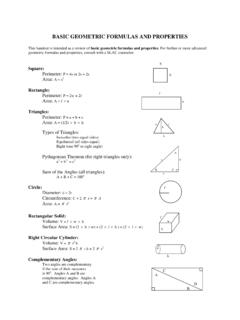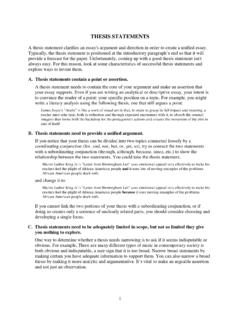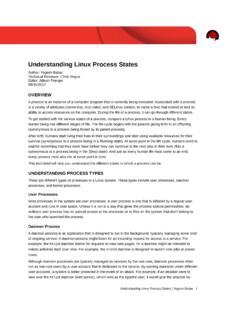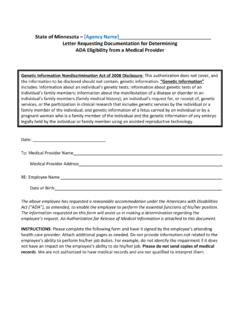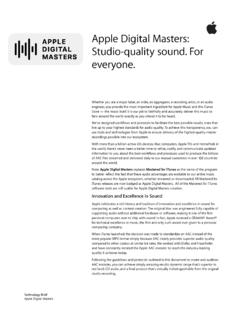Transcription of VERB TENSE FOR ANALYSIS OF LITERATURE AND HISTORY
1 1 VERB TENSE FOR ANALYSIS OF LITERATURE AND HISTORY Writing about LITERATURE 1. Whether you are dealing with fiction, poetry, or nonfiction LITERATURE , use the present TENSE (also called the literary present TENSE ) to discuss the actions and thoughts presented in the text. Do this because LITERATURE exists as a present phenomenon regardless of whether or not its author is alive. Here are some examples (the pertinent verbs are in bold type): In his "Qualities of the Prince," Machiavelli writes that it is better for a prince to be armed, because "among the other bad effects it causes, being disarmed makes you despised" (38). In her essay, "In Search of Our Mothers' Gardens," Alice Walker discusses the HISTORY of African American women and describes how "they dreamed dreams no one knew not even themselves, in any coherent fashion and saw visions no one could understand" as a result of the silence inflicted upon them by lack of education and prejudice (232). 2. Use past TENSE when writing about historical events, even those events involving the artists'/writers' actions in the past (pertinent verbs are in bold type): Machiavelli fell out of favor when the Medici princes returned to power and was imprisoned on suspicion of crimes against the state.
2 Alice Walker's parents were sharecroppers in Eatonton, Georgia. She participated in the Civil Rights Movement and published novels, short stories, poetry, essays, and children's books. 3. Occasionally, you'll need to use both present and past TENSE when discussing the author's position and opinions in the text and the author as a historical figure. At these times, it's helpful to split the author into two personas, the authorial voice the one writing the text and the historical figure who lived and (unless that author is a contemporary) died. If you need further help doing this, on early drafts of your essays you can refer to the authorial persona always as the "author" and use the author's name to refer to the historical person. During the revision process, you can then go back in and use the author's name occasionally to refer to the authorial persona so as to avoid repetitiveness. Note how this procedure is used in the following examples: As "The Yellow Wallpaper" hints, Perkins associated her experience with Weir Mitchell's rest cure with the experience of her protagonist in "The Yellow Wallpaper.
3 " By juxtaposing the protagonist's loss of sanity to her acquiescence to her husband's admonitions that she stay quiet and not do any productive work, the author is able to explore her own past, one in which Perkins too, was subject to a rest cure, and in which Perkins came close to losing her sanity as fully as does her protagonist in the story. Now, you can see the above without the labels discriminating authorial persona from historical person: As "The Yellow Wallpaper" shows us, Perkins associated her experience with Weir Mitchell's rest cure with the experience of her protagonist in "The Yellow Wallpaper." By juxtaposing the protagonist's loss of sanity to her acquiescence to her husband's admonitions that she stay quiet and not do any productive work, Perkins is able to explore her own past, one in which she too, was subject to a rest cure, and in which she came close to losing her sanity as fully as does her protagonist in the story. 2 4. Sometimes, also, when writing about poetry and fiction, you'll not only have the poet to contend with as a historical or authorial figure, but also the speaker of the poem or the narrator of the story (verbs have been cast in bold type).
4 In his poem "Punishment," Seamus Heaney's speaker begins reflecting upon the body of the Windeby bog girl. The speaker is viewing the body either on display in a museum, or, like Heaney himself did, in archaelogist Glob's book, The Bog People. The Windeby bog girl was killed, possibly for committing adultery, during the days of the Roman historian Tacitus, who lived around the time of the girl's death, from approximately 50-150 As the speaker describes the girl's body and her horrific death, he comes to admire her, then to admit to a certain complicity with her killers, even though he actually didn't participate in her murder. The speaker identifies with the killers because he stood, as the poet Heaney himself stood, and watched in silence as the bog girl's "betraying sisters" Irish women contemporary with the speaker and Heaney who dared consort with British soldiers and thus "betrayed" their Irish compatriots were bound, stripped, and tied to the railing and then "cauled with tar" in front of a condemning Irish public.
5 B. Writing about HISTORY 1. Again, use past TENSE to relate a historical fact. In writing about HISTORY , since you are not talking about a writer's or historical figure's timeless literary intent, but about things she/he said or did in a real time or place, you use the past TENSE (verbs have been cast in bold type). Although Lodge once had supported a post-war league, he reversed himself after Wilson linked such a plan to the concept of "peace without victory." This principle applies to thoughts as well as actions: Many progressives, who thought well of Wilson's dream of a new world order, drew back in revulsion when the terms of the treaty were published. 2. In general, use the present TENSE for giving opinions current among historians today. You will find the historical present of particular help when writing book reviews, for example (verbs have been cast in bold type). Link contends that Wilson's critics have minimized the difficulties he faced. 3. Finally, it's probably better to convey your historical statements in sentences that discuss directly the actions of historical actors, not the content of the sources (verbs have been cast in bold type).
6 So, instead of saying, "Document 7 shows Voltaire's contempt for priests," you might say instead, "Voltaire held priests in utter contempt (Doc. 7)." Sources: Lee A. Jacobus A World of Ideas, 6th edition and Alice Walker s In Search of Our Mother s Gardens, 1983 Created by: Rene' LeBlanc Spring 2003 STUDENT LEARNING ASSIST NCE CENTER (SLAC) ATexas State University-San Marcos




